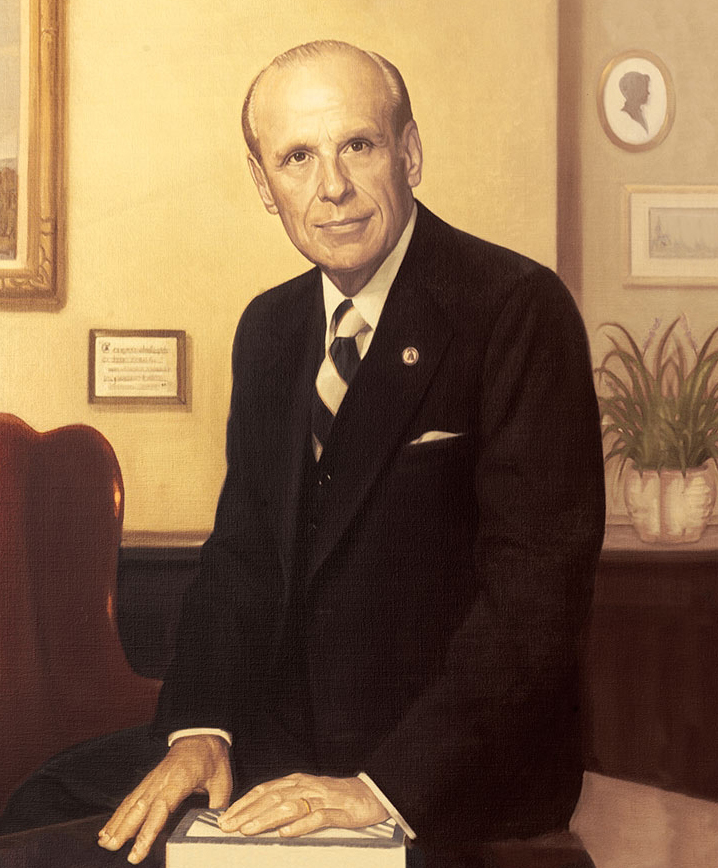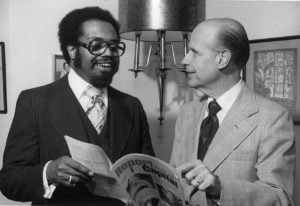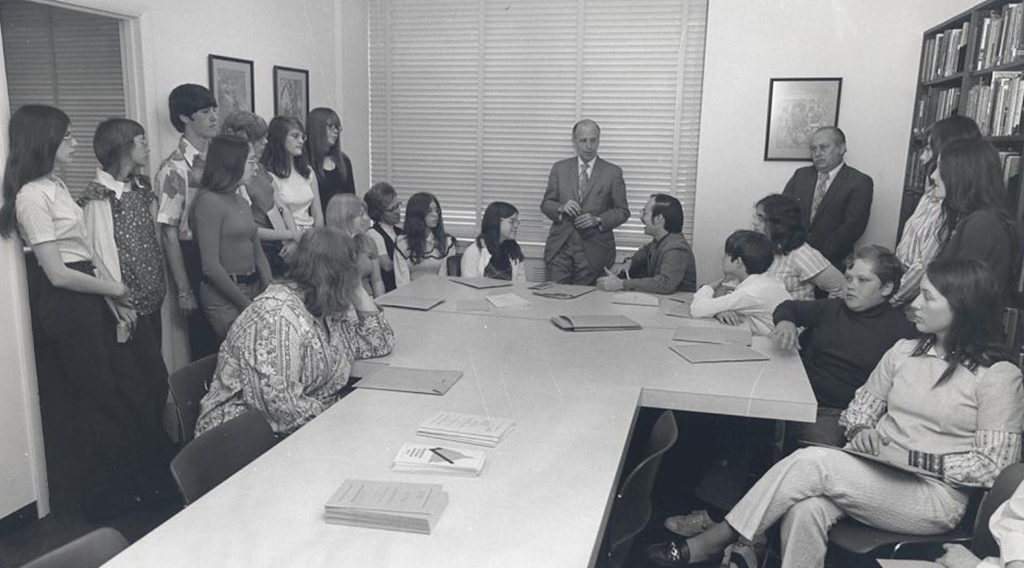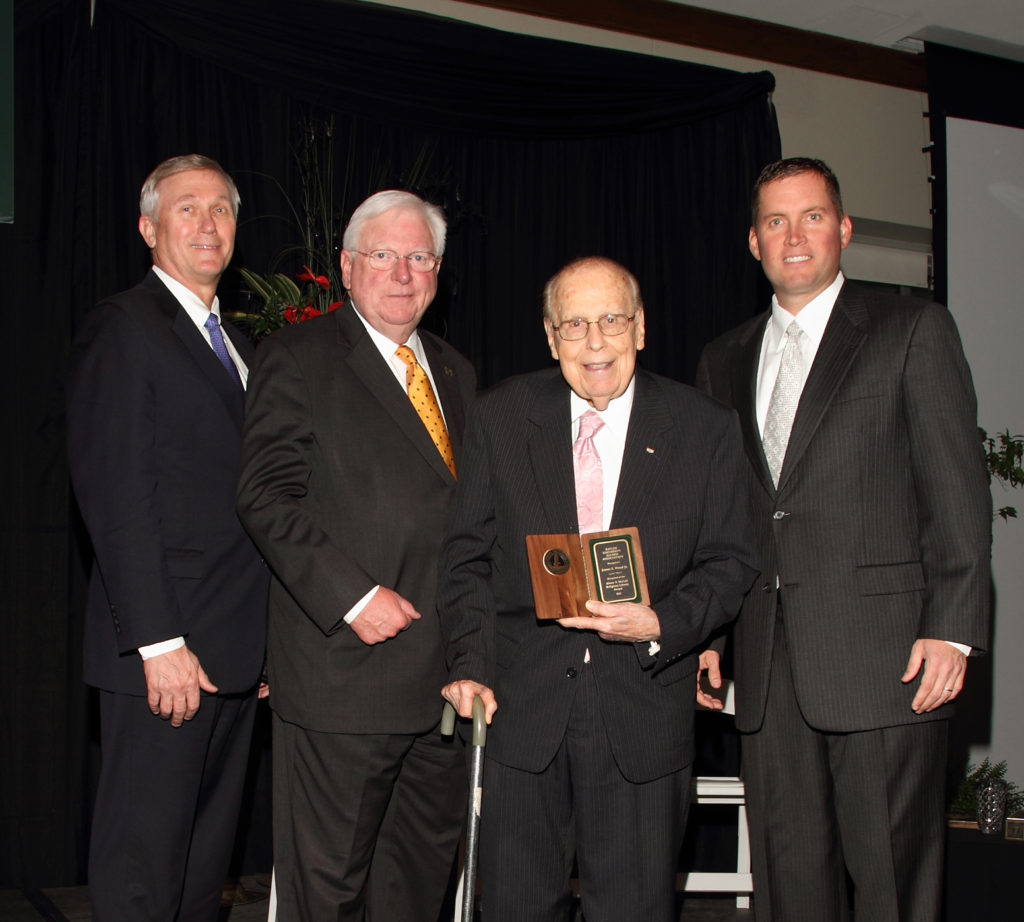 James E. Wood Jr., the accomplished author and scholar who led the Baptist Joint Committee in the 1970s, passed away March 24, 2019, at age 96. A former missionary and professor, Wood left his mark on the church-state field around the world through his academic pursuits, personal work and eight years leading BJC.
James E. Wood Jr., the accomplished author and scholar who led the Baptist Joint Committee in the 1970s, passed away March 24, 2019, at age 96. A former missionary and professor, Wood left his mark on the church-state field around the world through his academic pursuits, personal work and eight years leading BJC.
“James Wood was a prolific scholar of church-state relations, not only domestically in the United States, but internationally as well,” said Derek Davis, who worked with Wood at Baylor University. “He understood the subject, theologically and politically, as well as anyone.”
Born in Portsmouth, Virginia, on July 29, 1922, Wood’s vast academic experience bookended his time at the Baptist Joint Committee for Religious Liberty (then called the Baptist Joint Committee on Public Affairs). After earning undergraduate and seminary degrees, Wood and his wife, Alma, served as missionaries in Japan from 1950-1955 and then as faculty members at Baylor University in Waco, Texas.
Wood’s move to Baylor was the dawn of a new era of church-state studies at the school. He created courses and became the second director of what is now called the J.M. Dawson Institute of Church-State Studies, named for BJC’s first executive director. Wood launched the Journal of Church and State and expanded the institute and offerings on campus to include graduate courses in church and state, a research center and an annual lectureship/symposium on the topic.
After much success at Baylor, Wood came to the Baptist Joint Committee in September 1972 “because of a growing sense of the rightness of it in term of God’s direction for my life,” according to Davis’ biographical portrait of Wood in The Separation of Church and State Defended.
 In his inaugural address as head of BJC, Wood said the concern of the church for religious liberty “must necessarily include the concern of the church for all civil liberties as inalienable rights of all men.” His scholarly knowledge of the issue was vast, but his Christian commitment to the cause was evident in his work. He saw the issue also through the lens of God’s care for every human. “To be true to its mission, therefore, the church must be involved in public affairs because it seeks to minister to the whole man in the world, and no aspect of life can be regarded as outside of God’s concern, dominion, and power,” he said.
In his inaugural address as head of BJC, Wood said the concern of the church for religious liberty “must necessarily include the concern of the church for all civil liberties as inalienable rights of all men.” His scholarly knowledge of the issue was vast, but his Christian commitment to the cause was evident in his work. He saw the issue also through the lens of God’s care for every human. “To be true to its mission, therefore, the church must be involved in public affairs because it seeks to minister to the whole man in the world, and no aspect of life can be regarded as outside of God’s concern, dominion, and power,” he said.
In his eight years at the Baptist Joint Committee, Wood expanded the mission of the organization and emphasized a range of policy issues, including international human rights and ending the nuclear arms race.
Wood’s human rights emphasis began with “the historic Baptist conviction that the human spirit is innately sacred,” according to Stan Hastey, who worked with Wood at the Baptist Joint Committee.
 “It is safe to say that James Wood’s views were known inside the White House and the Department of State and that they helped the Carter administration lay a sound foundation in formulating an international policy based in large measure on the bedrock commitment of Baptists and others to freedom of conscience,” Hastey said. For example, Hastey remembers that Wood’s impassioned pleas on behalf of the imprisoned Soviet Baptist dissenter Georgi Vins were instrumental in securing Vins’ release from the USSR.
“It is safe to say that James Wood’s views were known inside the White House and the Department of State and that they helped the Carter administration lay a sound foundation in formulating an international policy based in large measure on the bedrock commitment of Baptists and others to freedom of conscience,” Hastey said. For example, Hastey remembers that Wood’s impassioned pleas on behalf of the imprisoned Soviet Baptist dissenter Georgi Vins were instrumental in securing Vins’ release from the USSR.
“James Wood was indefatigable, working tirelessly on a wide range of public policy issues he considered the rightful agenda of the Baptist Joint Committee,” said Hastey. When some wanted to move BJC’s work to other agencies, Hastey recalls Wood standing strong and rallying leaders to “make the case that the Baptist voice advocating religious liberty in the nation’s capital should remain one voice.”
In 1980, Wood left BJC to return to academic life and his position as the director of the J.M. Dawson Institute at Baylor and also as the Simon and Ethel Bun Professor of Church-State Studies on campus. His return continued the expansion of the institute and the academic pursuit of church-state issues on campus, including the eventual addition of a Ph.D. in church-state studies offered in the mid-1990s. He remained at Baylor until his retirement in 1999.
Wood’s background in world religions also led him to an active role overseas as communism began to decline in Europe. As president of the International Academy for Freedom and Belief, he consulted with a number of nations in the New Europe to assist in implementing protections for religious liberty in their constitutions, including Hungary and Russia.

Photo of 2012 Abner V. McCall Award Ceremony by Egon W. Schlottmann. Left to right: Roland Johnson, Fort Worth attorney and president of the board of directors of the Baylor Alumni Association; Gov. Mark White, emcee of the event; Dr. James E. Wood Jr., recipient of the Abner V. McCall Religious Liberty Award; Jeff Kilgore, Executive Vice President and CEO of the Baylor Alumni Association.
For his lifetime of work, Wood received numerous awards and honorary degrees. He was an abundant author as well, writing or editing more than 20 books on church and state, as well as hundreds of articles on the subject. His most recent award came in 2012, when he was recognized for his lifetime of service with the Abner V. McCall Religious Liberty Award from the Baylor Alumni Association.
Davis remembers Wood as a committed Christian who saw the separation of church and state as essential to the protection of the freedom of religious belief as well as basic civility. “Much like Roger Williams, a fellow Baptist, he believed separation of church and state not to be a divine mandate, but rather a practical tool – to prevent government, even unwittingly, from favoring one or more religions over others, and to protect the private religious practice of all people of all religions,” Davis said.
In his final column for the BJC’s magazine, Wood wrote, “I am deeply committed to Baptist representations to government as rooted in the theological principle of the mandate of involvement.” He lived that commitment in his various endeavors.
Wood was preceded in death by his wife, Alma, and is survived by their son, James E. Wood III.
For more on James E. Wood Jr., read The Separation of Church & State Defended: Selected Writings of James E. Wood, Jr., edited and with an introduction by Derek Davis.




